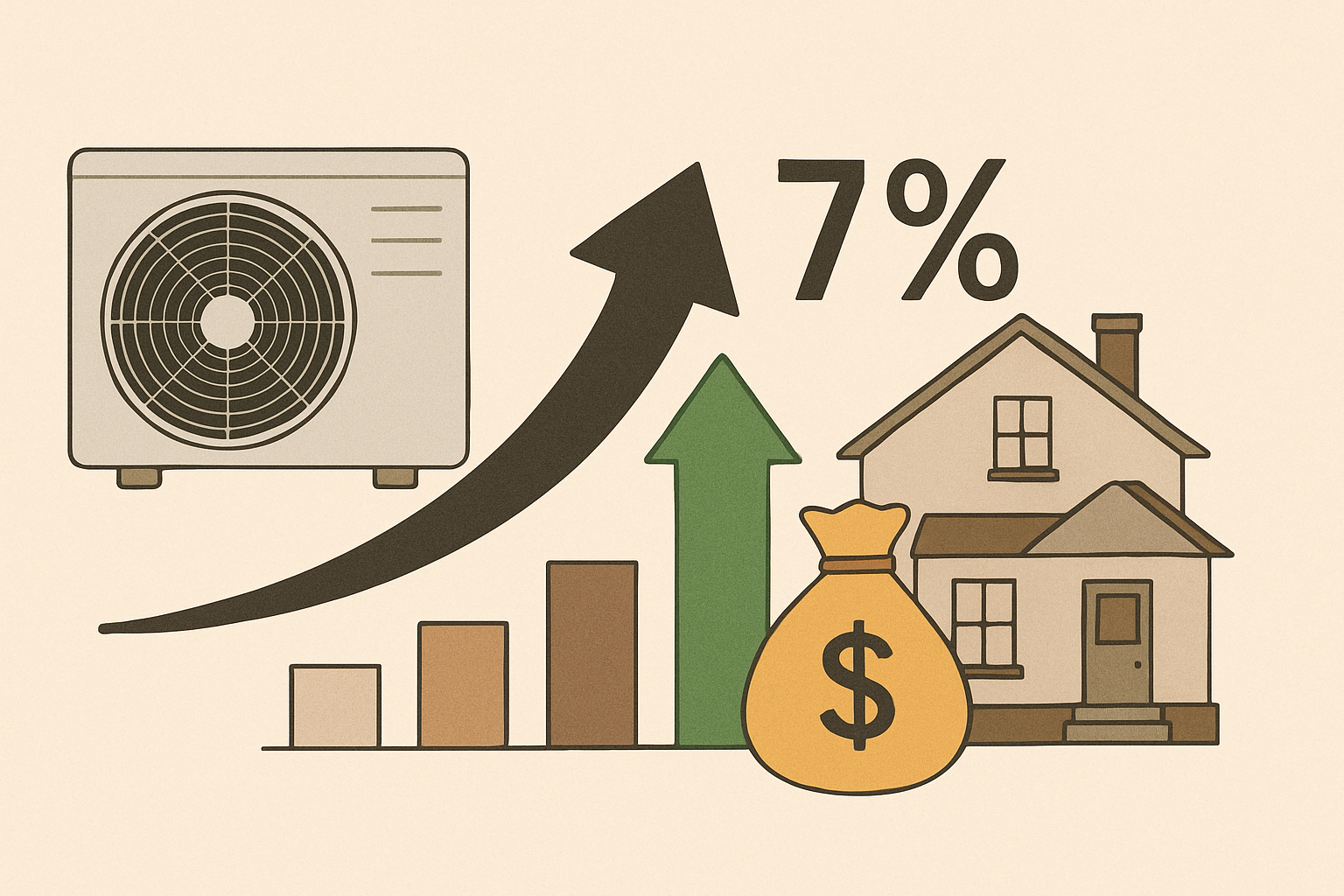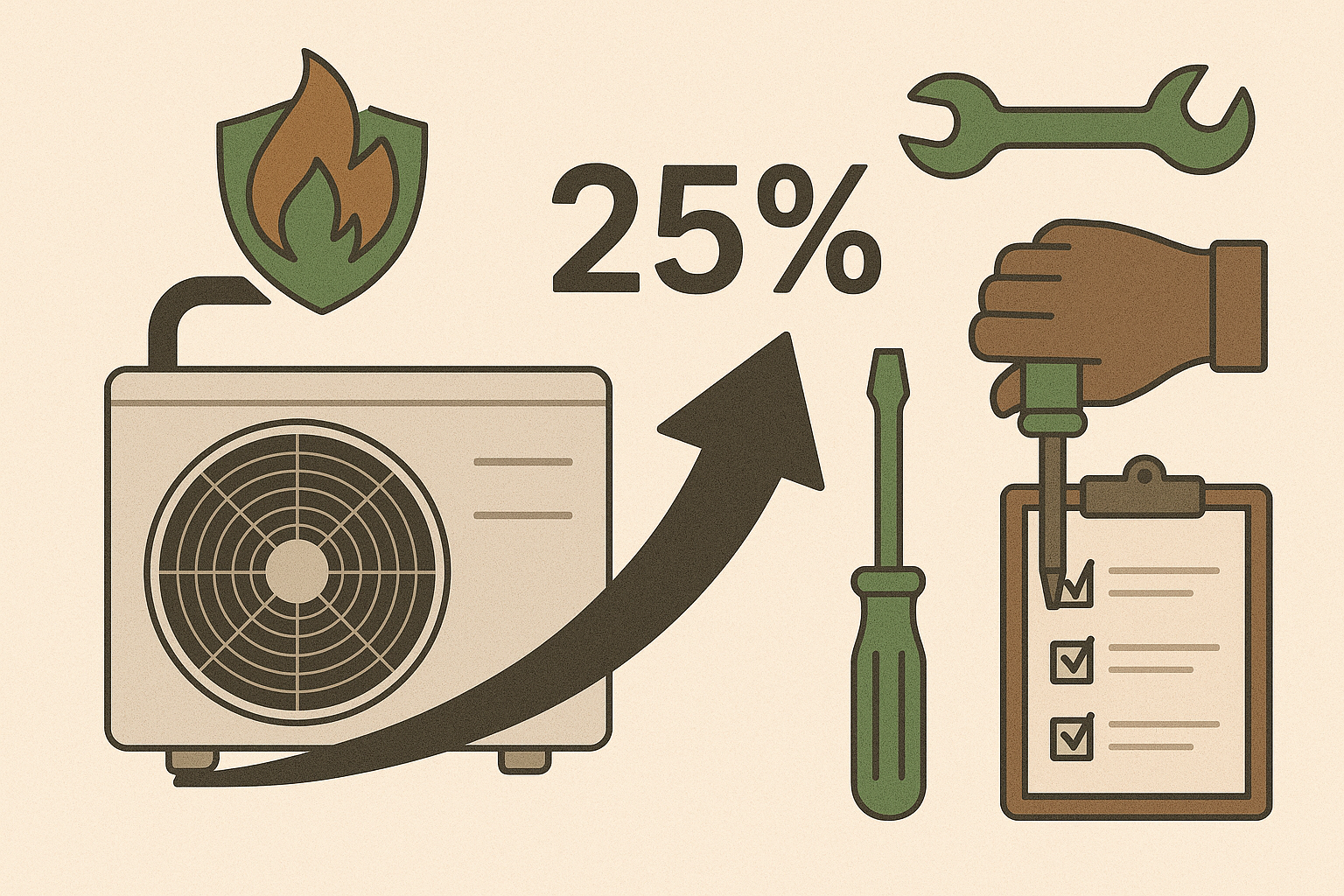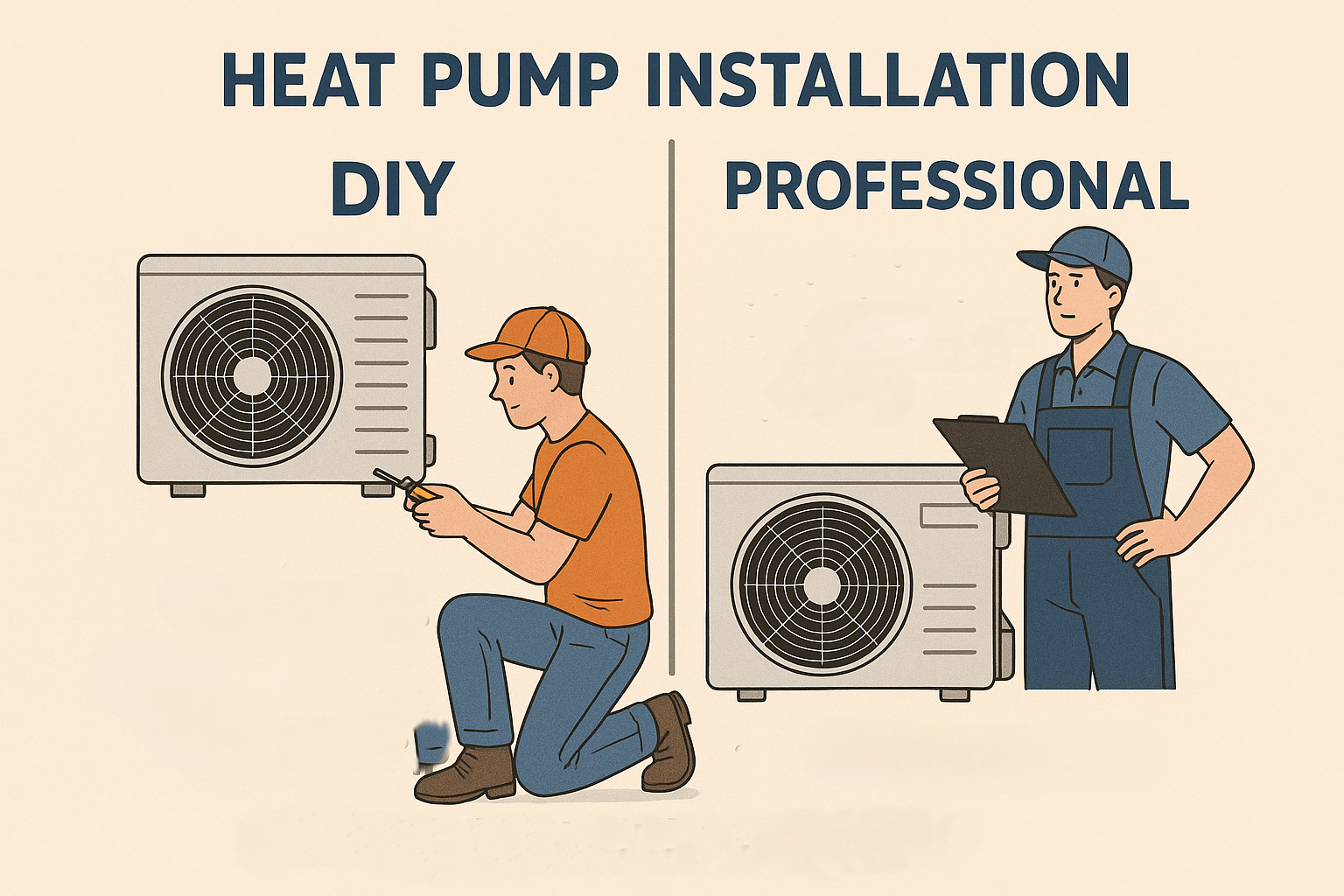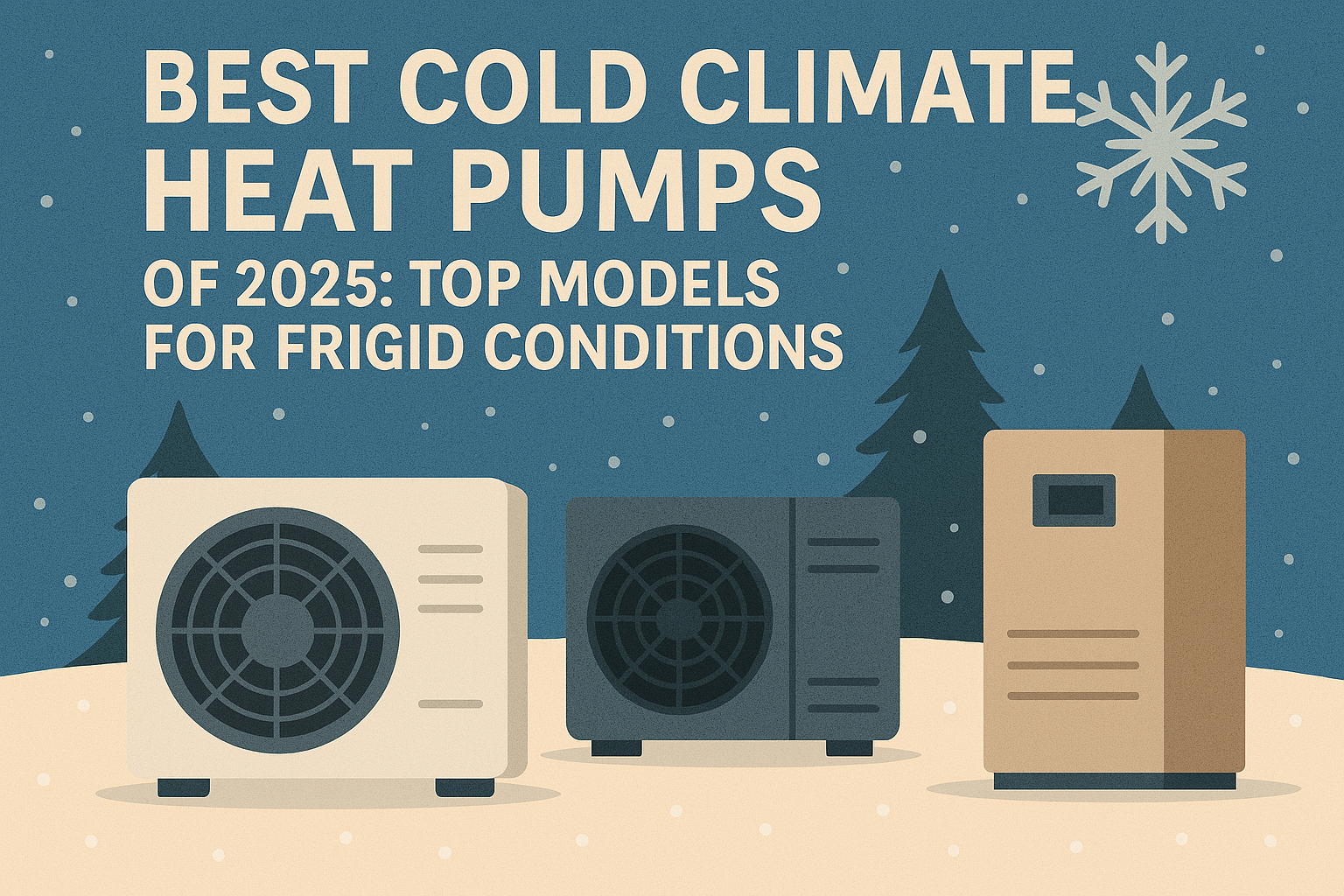How Installing a Heat Pump Can Increase Your Home's Value in 2025
In today's real estate market, energy efficiency isn't just good for the environment and your utility bills—it's becoming a significant factor in home valuation. As homeowners increasingly prioritize sustainable features, heat pumps have emerged as one of the most valuable upgrades you can make to your property. This comprehensive guide explores how installing a heat pump can boost your home's value in 2025, backed by research and real estate data.
The Financial Impact of Heat Pumps on Home Value
Recent studies have revealed compelling evidence that heat pumps significantly increase property values. Let's examine what the research tells us about the return on investment you can expect.
Research-Backed Value Increases
A groundbreaking study published in Nature Energy by researchers from the University of Maryland's Center for Global Sustainability found that heat pumps add a substantial premium to home values:
- Heat pumps increase the average home value by $10,400 to $17,000 in nearly half of U.S. states
- This represents a value increase of up to 7% of the total home price
- The price premium gained through installation is typically larger than the installation cost itself
Additional research from the World Wildlife Fund (WWF) supports these findings, showing that heat pumps can add between 1.7% and 3.0% to a home's value. Based on average home prices, this translates to:
- A value increase of $5,015 to $8,850 on a $295,000 home
- Higher percentages in areas where energy costs are elevated
- Greater premiums in regions with more extreme temperatures
Regional Variations in Value Increase
The value added by heat pumps isn't uniform across all markets. Several factors influence how much value a heat pump adds in different regions:
- Climate considerations: Cold climate regions often see higher value increases, as heat pumps provide both heating and cooling solutions
- Energy costs: Areas with high electricity rates compared to gas may see different valuation impacts
- Local real estate trends: Markets with more environmentally conscious buyers typically place higher premiums on heat pumps
- Housing stock age: Newer homes may see different value increases than older homes
Buyer Demographics and Preferences
The University of Maryland study identified specific buyer demographics most likely to pay premium prices for homes with heat pumps:
- Environmentally conscious buyers
- Middle-class homebuyers
- Residents in mild-climate regions
- Young professionals and families
- Buyers concerned about future energy costs
Understanding these demographics can help you better position your home when selling if you've installed a heat pump.
How Heat Pumps Compare to Other Home Improvements
When considering home improvements that increase value, it's helpful to compare heat pumps to other popular upgrades.
Value-Adding Home Improvements Comparison
Based on a property valued at the average U.S. home price of $295,000, here's how heat pumps compare to other energy efficiency upgrades:
| Improvement | Cost to Install | Value Increase (Low) | Value Increase (High) | ROI Potential |
|---|---|---|---|---|
| Heat Pump | $7,000-$13,000 | $5,015 (1.7%) | $17,000 (5.8%) | 71-131% |
| Solar Panels | $5,900-$6,400 | $1,475 (0.5%) | $5,900 (2.0%) | 25-92% |
| EV Charging Station | $500-$1,000 | $5,900 (2.0%) | $8,112 (2.75%) | 590-1622% |
| EPC Rating Improvements | $1,400-$10,000 | $33,394 (11.3%) | $59,000 (20.0%) | 590-2385% |
As this comparison shows, heat pumps offer a compelling return on investment, often paying for themselves (and more) when it comes time to sell your home.
Beyond Direct Value: Additional Financial Benefits
The value increase of your home is just one financial benefit of installing a heat pump. Several other factors contribute to the overall financial advantage:
Energy Cost Savings
Heat pumps can significantly reduce your monthly energy expenses:
- According to WWF research, heat pumps can reduce heating costs by approximately 37% or $1,290 per year
- These savings continue to accumulate throughout the life of the system
- As energy prices rise, the comparative savings typically increase
- The total lifetime savings often exceed the initial installation cost
Tax Credits and Incentives
The 2025 landscape for heat pump incentives is particularly favorable:
- Federal tax credits of up to $2,000 (30% of costs) for qualifying heat pumps through the Inflation Reduction Act
- Additional state and utility rebates that can reduce upfront costs by thousands more
- Income-based rebates of up to $8,000 for qualifying households
- Combined incentives can cover 50-100% of installation costs in some cases
Reduced Maintenance Costs
Heat pumps often require less maintenance than traditional heating systems:
- No combustion components means fewer parts that can fail
- No risk of carbon monoxide leaks or gas line issues
- Typical annual maintenance costs of $150-$200
- Longer average lifespan than many conventional heating systems
How Heat Pumps Improve EPC Ratings and Home Value
Energy Performance Certificate (EPC) ratings have become increasingly important in home valuation, and heat pumps can significantly impact these ratings.
EPC Rating Impact
Research shows that good EPC ratings can increase home value by up to 20%. Heat pumps contribute to better EPC ratings through:
- Improved energy efficiency metrics
- Reduced carbon emissions
- Enhanced overall home performance scores
However, it's worth noting that EPC rating systems in some regions are still catching up to heat pump technology. Some considerations:
- Traditional EPC methodologies may favor gas heating due to historical energy price differences
- Some regions are updating EPC calculations to better reflect heat pump efficiency
- Combining heat pumps with other energy efficiency improvements maximizes EPC benefits
Complementary Improvements
To maximize both EPC ratings and home value, consider combining heat pump installation with:
- Improved insulation (loft, wall, and floor)
- Double or triple glazed windows
- Low-energy lighting throughout
- Solar photovoltaic panels
- Smart home energy management systems
Heat Pump Features That Add the Most Value
Not all heat pumps add the same value to your home. Certain features and specifications tend to command higher premiums:
High-Value Heat Pump Features
- Dual functionality: Systems that provide both heating and cooling can add up to an additional 2.5% to home value
- Energy efficiency ratings: Higher SEER and HSPF ratings correlate with higher value increases
- Smart controls: Wi-Fi enabled systems with smart home integration
- Zoning capabilities: Systems that allow for room-by-room temperature control
- Cold climate performance: Units that maintain efficiency in extreme temperatures
- Noise reduction technology: Quieter systems are more appealing to buyers
- Brand reputation: Systems from established manufacturers with strong warranties
System Types and Value Impact
Different heat pump configurations may affect value differently:
- Ducted systems: Often preferred in markets accustomed to central HVAC
- Ductless mini-splits: Can add premium value in homes without existing ductwork
- Geothermal systems: Though more expensive to install, can add the highest value premium
- Hybrid/dual-fuel systems: Particularly valuable in regions with extreme temperature variations
Real Estate Market Trends Supporting Heat Pump Value
Several current real estate market trends are strengthening the value proposition of heat pumps:
Growing Environmental Awareness
- 78% of U.S. adults express concern about rising home energy bills
- Millennial and Gen Z buyers increasingly prioritize sustainability features
- Energy efficiency has moved from a "nice to have" to a "must have" for many buyers
Regulatory Changes
- Many regions are implementing or considering gas hookup bans for new construction
- Building codes are increasingly favoring electrification
- Future-proofing homes against potential carbon taxes or emissions regulations
Changing Energy Landscape
- Heat pump sales surpassed gas furnaces for the first time in 2022
- Utility companies are offering increasingly generous incentives for electrification
- Growing awareness of indoor air quality benefits from non-combustion heating
Maximizing Value When Selling a Home with a Heat Pump
If you're planning to sell a home with a heat pump, these strategies can help you maximize the value premium:
Marketing Strategies
- Highlight energy cost savings with actual utility bill comparisons
- Emphasize both environmental and comfort benefits
- Provide documentation of professional installation and maintenance
- Feature the heat pump prominently in listing photos and descriptions
- Include information about any remaining warranty coverage
Working with Real Estate Professionals
- Choose agents familiar with marketing energy-efficient homes
- Ensure the heat pump is properly valued in comparative market analyses
- Consider having an energy audit to quantify efficiency benefits
- Provide agents with specific heat pump features and benefits to highlight
Timing Considerations
- Value premiums for heat pumps tend to be higher during extreme weather seasons
- Energy efficiency features often gain more attention during periods of high energy prices
- Installation at least 1-2 years before selling allows you to demonstrate actual cost savings
Case Studies: Real-World Value Increases
Let's examine some real-world examples of how heat pumps have affected home values:
Case Study 1: Northeast Suburban Home
- 2,200 sq ft colonial-style home built in 1985
- Replaced oil heating system with air-source heat pump
- Installation cost: $12,500 (after $2,000 tax credit)
- Home value increase: $21,000 (4.7% on $450,000 home)
- Additional benefit: $1,800 annual energy cost savings
Case Study 2: Pacific Northwest Townhouse
- 1,500 sq ft townhouse built in 2000
- Installed ductless mini-split heat pump system
- Installation cost: $8,200 (after utility rebates)
- Home value increase: $15,500 (3.1% on $500,000 home)
- Additional benefit: Improved comfort and added cooling capability
Case Study 3: Midwest Single-Family Home
- 1,800 sq ft ranch-style home built in 1972
- Replaced aging gas furnace and AC with dual-fuel heat pump system
- Installation cost: $14,000 (after incentives)
- Home value increase: $19,000 (6.3% on $300,000 home)
- Additional benefit: Enhanced reliability and reduced maintenance costs
Planning for Maximum ROI
If you're considering a heat pump installation specifically to increase home value, these strategies can help maximize your return on investment:
Optimal Timing
- Install 2-5 years before selling to demonstrate energy savings while still having relatively new equipment
- Consider installation during shoulder seasons when HVAC contractors may offer better pricing
- Time installation to take advantage of the most generous available incentives
System Selection
- Choose systems with features that appeal to your local buyer demographic
- Balance upfront cost with efficiency ratings and features
- Consider manufacturer reputation and warranty coverage
- Select appropriate capacity based on professional load calculations
Installation Considerations
- Use qualified, certified installers with heat pump expertise
- Ensure proper documentation of all work for future buyers
- Consider how the system integrates with your home's aesthetics
- Maintain service records to demonstrate proper care
Conclusion
The evidence is clear: installing a heat pump is not just an environmentally responsible choice—it's a financially savvy investment in your home's value. With potential value increases of 1.7% to 7%, heat pumps often pay for themselves through a combination of energy savings and increased property value.
As we move through 2025, with strong incentive programs, growing environmental awareness, and increasing energy costs, the value proposition for heat pumps continues to strengthen. Whether you're planning to sell soon or simply want to make a sound long-term investment in your property, a heat pump installation deserves serious consideration.
By understanding the factors that influence value increases, choosing the right system, and properly maintaining your investment, you can maximize both the comfort of your home and its market value for years to come.
FAQs About Heat Pumps and Home Value
Q: How quickly will a heat pump increase my home's value? A: The value increase occurs immediately upon installation, though the full benefit may be best realized after you've demonstrated actual energy savings over at least one heating/cooling season.
Q: Do all types of heat pumps add the same value? A: No. Geothermal systems typically add the most value, followed by high-efficiency air-source heat pumps. Ductless mini-splits and ducted systems may be valued differently depending on your local market.
Q: Will a heat pump always increase my home's value? A: While research shows consistent value increases across most markets, the amount varies by region. In areas with very low natural gas prices or in luxury homes where heating costs are a smaller consideration, the premium may be lower.
Q: How do I document the value increase for appraisers or potential buyers? A: Keep records of installation costs, energy bills before and after installation, maintenance records, and manufacturer specifications. Consider having an energy audit that quantifies the efficiency improvements.
Q: Is it better to install a heat pump or make other energy efficiency improvements? A: Often, the best approach is a combination. Improving insulation and air sealing before installing a heat pump will maximize both comfort and value. If budget constraints exist, prioritize based on your home's specific needs and local market preferences.
Q: How does a heat pump compare to solar panels for increasing home value? A: Both add value, but in different ways. Heat pumps typically offer a higher percentage return on investment, while solar panels may add more total value but at a higher installation cost. The best choice depends on your specific home, climate, and local incentives.
This article is for informational purposes only and does not constitute financial or real estate advice. Home value increases vary by market, property type, and other factors. Consult with qualified real estate professionals regarding your specific circumstances.



